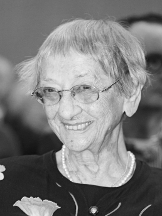

On 11 January 2018, Dora Schindel died in Bonn aged 102. Born in Munich, Dora Schindel was closely associated with the German National Library’s German Exile Archive 1933–1945 for many years – as a contemporary witness, as a contributor, and not least as a highly esteemed friend.
After the Nazis came to power, Dora Schindel worked with scholar and politician Hermann M. Görgen to organise the emigration of 48 endangered persons to Brazil. The “Görgen group” included novelist Susanne Bach, writer Ulrich Becher, biologist Alfred Goldschmidt, publicist Walter Kreiser and musician Georg Wassermann. Dora Schindel remained in Brazil until 1955. After she returned to Germany, the promotion of intercultural dialogue between both countries became her life's work. Until her death, Dora Schindel was an honorary member of the executive committee of the Deutsch-Brasilianische Gesellschaft (German-Brazilian Association) and the Latin American centre.
More
: Dora Schindel (1915–2018) – In memoriam …
